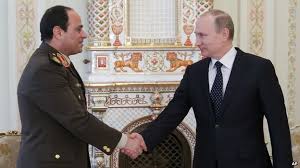 In his first trip outside the country since ousting former president Mohamed Morsi, Egypt's army chief Abdel-Fattah El-Sisi met with his Russian counterparts in Moscow to discuss a planned $2 billion arms deal.
In his first trip outside the country since ousting former president Mohamed Morsi, Egypt's army chief Abdel-Fattah El-Sisi met with his Russian counterparts in Moscow to discuss a planned $2 billion arms deal.
The deal includes a Russian air defence system and, if signed as expected, will be the biggest military purchase from Russia since the Soviet era, marking a possible rekindling of a historic alliance that ended in the 1970s when former president Anwar Sadat reoriented Egypt's position in favour of the US.
El-Sisi insisted in an interview earlier this week that closer relations with Russia are no replacement for existing relations with other countries.
His high-profile visit to Russia, in the company of Egypt's foreign minister Nabil Fahmy, featured a meeting with Russian President Vladimir Putin, who expressed his firm support for El-Sisi's presidential bid, not yet announced from the field marshal but widely anticipated.
El-Sisi stressed that the meeting represents "a new departure" for Egyptian-Russian military and technological cooperation, reported Egypt's state news agency MENA.
Aside from Putin, the two-day talks were headed by Russia's defence minister Sergei Shoigu and foreign minister Sergei Lavrov.
In a joint press conference following Thursday's talks, Fahmy and Lavrov didn't mention the military deal.
Instead, both ministers stressed the importance of Egypt and Russia's bilateral relations in all spheres – military, economic and cultural – and that they see eye-to-eye regarding foreign intervention in the affairs of the Middle East.
On this issue, the ministers issued a joint statement regarding Syria which seemed to be a continuation of Russia's policy on the war-torn country – backing the regime of Bashar Al-Assad and consistently blocking foreign military intervention.
The statement asserted that both countries' rejected foreign intervention in Syrian affairs and stated their "utmost respect for the sovereignty, independence and unity of Syrian lands," and said they condone a political settlement for the Syrian crisis.
Lavrov and Shoigu both visited Cairo last November, a meeting in which the framework for the current arms deal was first signed, according to a Reuters report citing Sergei Chemezov, head of Russia's state industrial holding company Rostec.
Lavrov denied that Russia was striving to replace "any country" – a reference to the US – as Egypt's key strategic partner.
Egypt's decades-long alliance with the US was recently shaken by Morsi's removal from power, a move the US did not initially support.
The US held back deliveries of military hardware – part of its long-entrenched aid program for Egypt – pending a democratic transition in the country, it had said.
"The move closer to Russia is a rebalancing of Egyptian strategic relations after decades of residing in Washington's sphere," said Moetaz Salama, international relations analyst at Al-Ahram Center for Political and Strategic Studies.
Salama believes the move reflects a changing world and can be seen as a more realistic and dynamic way for Egypt to manage international relations.
He also saw the trip as a chance to present El-Sisi as a capable leader to Egyptians and the world.
Russia's Putin was the first president to congratulate Egypt on the approval of its 2014 constitution, which passed in a referendum that many saw more as a vote on El-Sisi's viability as Egypt's next president.
Putin said that El-Sisi's run for president would be "a very responsible decision: to undertake such a mission for the fate of the Egyptian people."
"On my own part, and on behalf of the Russian people, I wish you success," he said.



